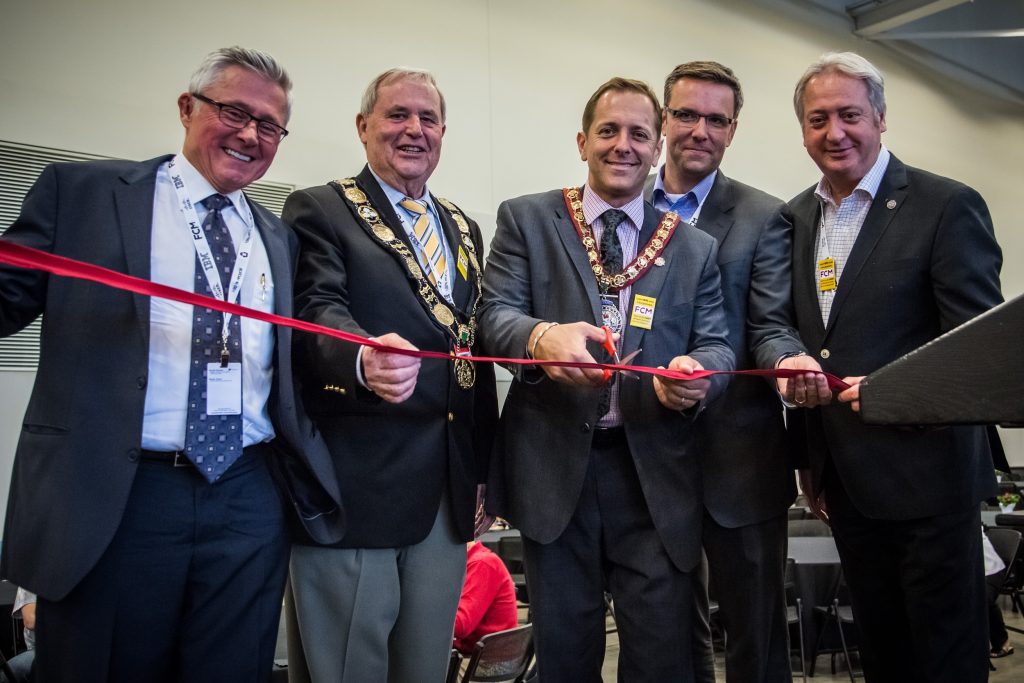
How far we’ve come: Cisco and the Federation of Canadian Municipalities
3 min read
Hundreds of Smart Communities, and thousands of municipal leaders from across the country, embarked on Niagara Falls May 29 – June 3, 2014. During a jam-packed five-day event, the Federation of Canadian Municipalities (FCM) hosted its Annual Conference and Tradeshow. One of the highlights was FCM’s Annual General Meeting, during which Mayor Brad Woodside of Fredericton was installed as FCM’s new president.
In between the prominent speakers from Federal and Provincial governments, including Federal PM hopeful (2015) Justin Trudeau, FCM again pulled together a full agenda of industry and policy break-out sessions to help facilitate the dialogue between municipalities and their leadership, and drive the shared message of growth, development and engagement.

Left to right: John Longbottom (Canadian Smarter Cities Strategy Leader, IBM), Gary Burroughs (Regional Chair, Niagara Region), Jim Diodati (Mayor, City of Niagara Falls), Rick Huijbregts (Vice-President, Smart and Connected Communities, Cisco Canada), and Claude Dauphin (FCM President)
Cisco is in its third year of its partnership with FCM. It has been a great partnership between two like-minded organizations, as we look for opportunities to grow Canada’s economy and create prosperous and (globally) competitive communities. FCM has provided Cisco a great platform to share our beliefs on innovation, collaboration, and productivity with Canada’s municipal leaders.
Three years ago, technology and innovation weren’t really topics of discussion at FCM or amongst its members. “Cisco” was confused with the food delivery company, and many scratched their heads as to why we would be investing in the partnership. I think the tide has turned. Cisco has almost become a household name at FCM’s Annual General Meeting and Tradeshow. The topic of technology, innovation, and Smart Communities is increasingly top of mind with Canada’s municipal leaders as they all look for ways to differentiate themselves and provide a healthy environment for businesses and citizens to thrive. It is now well understood that technology is a great enabler and a trend to be reckoned with. The question for many has become how to embrace and nourish it.
To stimulate the conversation on technology innovation, FCM introduced a new initiative at this year’s event. Before each of the break-out sessions, the audience was challenged to answer some thought-provoking questions related to each of the session topics, exploring the role and opportunity of technology and innovation as we try to deal with day-to-day issues. The findings of the audience responses will be made available in the near future, and will continue to guide the direction of discussions that need to take place in Canada.
We also hosted our own break-out session, in partnership with our Smarter Communities partner IBM. Together we facilitated a lively panel discussion with three Canadian communities that are leading the charge in pursuing the opportunities and benefits of being a Smart Community. St. Albert, Winnipeg and Halifax have all embraced technology to help them innovate, and all three communities have partnered with the ICT community to pave the way to economic prosperity and opportunity. We are proud to call ourselves partners of these, and numerous other Canadian communities, and hope they set the example for the rest of Canada. Only when we collaborate can we truly pursue 21st Century excellence, and provide environments for private sector, public sector and individuals to thrive.
Another exciting program Cisco sponsored for the second year was the Youth Panel and reception. The future of our country lies in the hands of our youth, yet we have difficulty engaging them in politics, partaking in the election process, or seeking employment in government.
It is clear that Canada still has lot to do to make politics more interesting to the “app generation.” It is also clear that the status quo isn’t really going to work, as we’ll get more of the same. Cisco will continue to participate in the conversation and plan to do our part to build bridges between politics and the next generation of voters and government workers. This next generation is wired differently than today’s political incumbents, and it has greatly to do with the evolution of technology and the importance of the Internet. At Cisco we get that, and we will help.
We closed our participation at the conference with an interactive luncheon for select municipal leaders from across the country (Winnipeg, New Westminster, St. Albert, Toronto, Markham, Vaughan, Waterloo, Richmond Hill and several others). Rather than presenting our vision of the future, we turned the tables and asked them what they need (from us) to be more innovative and productive. Topics included: partnerships; challenging the procurement process (moving from low-cost RFP processes to new RF “innovation” approaches); and best practice sharing.
Join in the conversation: what needs to happen for Canada’s communities to become intelligent, embrace “smart” and help leapfrog the Country into a cycle of growth and opportunity?
If you want to join the movement and start or accelerate your own journey, it is still not too late to register for a unique two-day class at the Harvard Graduate School of Design, Executive Education on Smart Cities.
